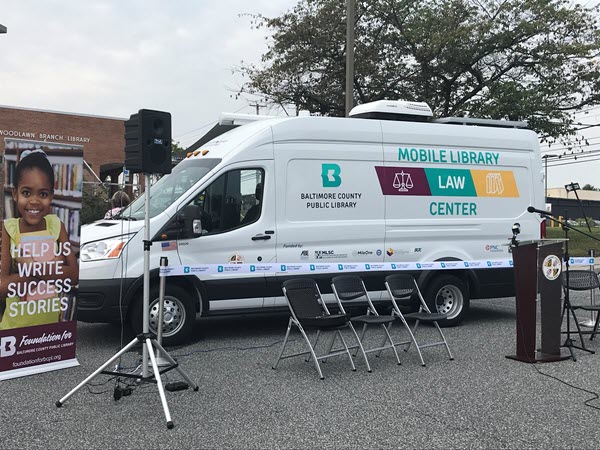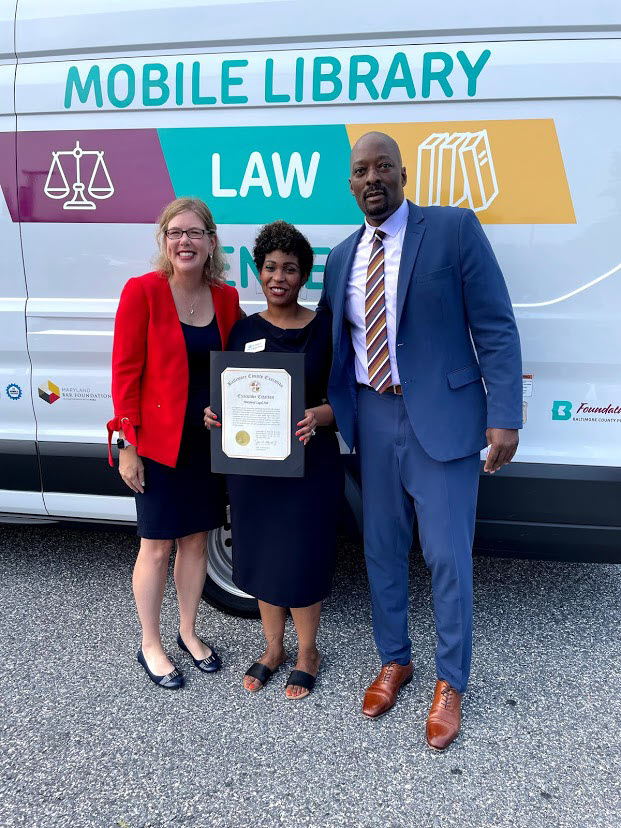Mobile Library Law Center Launches

Provided by Maryland Legal Aid
If there was ever any doubt about the library’s role as a safe space and community anchor, they were erased for Baltimore citizens when the Enoch Pratt Free Library remained open at the epicenter of the protests following Freddie Gray’s death, while in police custody. The Lawyer in the Library program between the Enoch Pratt Free Library in Baltimore City and Maryland Legal Aid developed after the riots and spread across the state, offering patrons onsite legal help with problems such as evictions and expungements. Maryland Legal Aid provided the volunteer attorneys and the legal expertise, and the library provided the space, relationships and outreach. The program helped bridge the justice gap – that gap between the civil legal needs of low-income folks and the resources to meet those needs.
As the Lawyer in the Library program continued its expansion throughout Maryland, it received a big boost in August 2021 when Baltimore County Public Library debuted its Mobile Library Law Center. “We are proud to be the first library system in the country to own and operate a mobile legal vehicle, servicing those who don’t have access to legal help,” said Baltimore County Public Library Director, Sonia Alcántara-Antoine. The unit will travel twice a week to underserved areas on the east and west sides of Baltimore County, serving as a mobile legal office. Lawyers from Maryland Legal Aid (MLA) will provide free civil legal advice for those who are financially eligible in areas such as bankruptcy, child custody and support, debt collection, expungements, government benefits, housing, landlord/tenant, veterans’ benefits, and unemployment benefits. Using census data and figures on assets, income and employment, the program targets individuals with disabilities, seniors, veterans and those who are economically disadvantaged. Lawyers are anticipating many evictions questions. A study of eviction cases in Baltimore last year found that “tenants with legal representation are more likely to avoid eviction. The study also found that just 1% of tenants had counsel in eviction cases compared to 96% of landlords.” A librarian will also be on board to provide research resources and assist with intake.
"There are a few other mobile units across the country, but none that are operated by a library," Executive Director Deb Seltzer of Maryland Legal Services Corporation noted. "With the library as a trusted partner and recognized institution, a client may say, 'Even if I don't go to the library often, I know what the library is, I know that that's a community resource, so even if I haven't heard of Maryland Legal Aid or I don't recognize that I need a lawyer, I'm going to check this out because I trust the resources the library has to offer.'"

Amy Petkovsek, Baltimore County Public Library Director
Sonia Alcántara-Antoine and Baltimore County Community
Engagement Coordinator Kirk Mitchell. Provided by
Maryland Legal Aid.
Collaboration at its finest
Several years ago, Maryland Legal Aid and its library partners met to talk about how the library served its most vulnerable patrons, and how lawyers could complement these services. Maryland Legal Aid Deputy Chief Counsel Amy Petkovsek said, “Libraries are connectors, resource providers, and they’ve been here forever. Libraries are experts at delivering services. We are experts at moving things through the legal system. In general – let’s take our legal skills and just listen. That’s our approach. How can we fit in? This collaboration works because we are cognizant of what each other is good at.”
As they discussed how to maximize service delivery, the city mentioned that they had had success with mobile units, e.g. a mobile workforce unit would include library staff to help with resume writing and a lawyer to help with expungements. Unfortunately, the buses would break down, and maintenance became a headache. Maryland Legal Aid did not want to be in charge of a vehicle, but the library was already in the business of owning and maintaining vehicles. Baltimore County suggested they could build a unit specifically for a mobile law library. The lawyers requested privacy as well as an awning, so library staff could do outreach outside, and the mobile unit would need to be readily equipped with technology – wifi, printers, etc. Baltimore County received funds from several sources including the Maryland Bar Association, Maryland Legal Services Corporation, Foundation for Baltimore County Public Library, and other foundations. After the mobile unit was built and ready to go, they began selecting locations – looking for pockets of people in need, without access to a library. The unit launched in August (see video summary of ribbon-cutting ceremony), and the team will adjust the schedule as they learn more about demand.
From the recent LAW360 article, Pioneering Md. Center Takes Legal Aid On The Road:
Maryland Legal Aid's deputy chief counsel Amy L. Petkovsek explained that this kind of wraparound mobile legal service not only meets people in need where they're at, but also helps address some of the background pressures that they face. For instance, people who might seek an expungement from their permanent records or protection from an abuser may also need help applying for jobs, so they can live independently; the Mobile Library Law Center provides all of these services, while helping people avoid paying for gas or public transit passes that they maybe could not afford anyway.
"By having this mobile unit and parking outside a public housing complex, we take all that stress away," Petkovsek said. "And the removal of stress is the goal here – to make people feel legally well, to make them feel healthy, to allow them to feel like they can make their own choices going forward.” This experiment with a mobile library center is groundbreaking and a great testament to authentic collaboration – each partner bringing its expertise to respond to a need. Alcántara-Antoine, library director at Baltimore County, shared that, “Libraries are democratic institutions, giving everyone equal access to resources that will truly create an inclusive society. Initiatives such as this ensure that those most in need have equal access to justice.”
Learn more about libraries and Civil Legal Justice
- Creating Pathways to Civil Legal Justice, a free self-paced course series available in WebJunction’s Course Catalog, exploring how public libraries can help to address the justice gap. Learn more about the course series, including a short video, in this announcement.
- Find additional resources related to libraries and legal services: oc.lc/legal-justice
